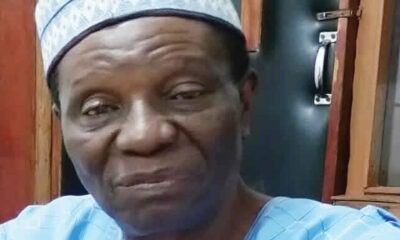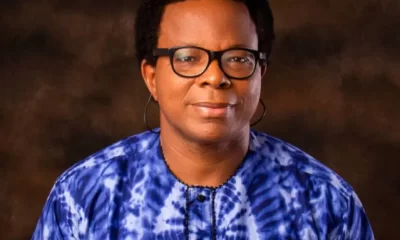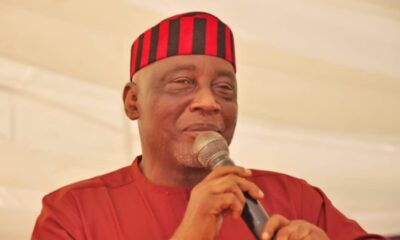National Issues
Where is That Abuja Judge? Wike’s Move, Fubara’s Audacity, Ganduje’s Strategy, Yusuf’s Boldness -By John Egbeazien Oshodi
Amid the comedic chaos of Emir Muhammadu Sanusi II’s reinstatement by the Kano State Government, reports of a Federal High Court ex-parte order issued in the absence of Justice Liman, whether in the USA or elsewhere, add a whimsical twist. This peculiar situation, intertwined with Kano figures, infuses a delightful touch of comedy into the unfolding legal drama. While hinting at Ganjude’s potential involvement in a playful manner, the absurdity of the scenario is evident.

Oh no, Minister Wike! Governor Fubara’s bold move to replace your loyalists with his handpicked commissioners has set off a political firestorm of epic proportions. This audacious maneuver showcases a power play that seems to overshadow your existing political structure. Governor Siminalayi Fubara’s unwavering actions push boundaries as he ushers in his new commissioners, deftly reshaping the political landscape with strategic acumen. The loyalist commissioners, initially resigning and later coerced back due to interference by President Bola Tinubu, eventually resigned again as they grappled with divided loyalties between you, Minister Nyesom Wike, and Governor Fubara. Their exit signifies a notable shift in this unfolding political narrative.
In a comic yet stark reflection of reality, the once seemingly invincible Minister Wike now faces the unsettling truth that power dynamics can swiftly shift in the unforgiving world of politics. The grandiose aura of being godlike in influence has been shattered, revealing the fragile nature of political stature and the swift ascent of those who adeptly navigate the intricate web of power plays.
As Fubara’s boldness takes center stage, it serves as a cautionary tale for all political actors, reminding them that hubris can quickly turn into downfall in the ever-evolving landscape of governance. The spectacle of Fubara’s rise to dominance, while comical in its audacity, echoes a deeper truth about the transient nature of power and the importance of adaptability in the face of changing political tides. Minister Wike’s once unshakable grip on authority now trembles, a poignant reminder that in the realm of politics, even the mightiest can be humbled by the swift currents of power dynamics.
Abdullahi Ganduje, the national chairman of the All Progressives Congress and Former Governor, along with Governor Abba Kabir Yusuf’s bold decision to reinstate Sanusi, introduces a new layer of complexity to the political narrative. Governor Abba Yusuf’s move to bring back Sanusi further entangles the intricate web of deceit within the political landscape. The audacious actions of Fubara and Yusuf shine brightly in this unfolding story. With the enigmatic ‘Abuja judge’ known for his peculiar orders stepping into the scene, a dramatic turn is imminent, subtly influencing events to maintain the status quo. These judges, often seen as influenced by political motives, may soon face scrutiny for prioritizing political expediency over justice, potentially inviting criticism and mockery for their compliance.
In the midst of political turmoil, Fubara’s strategic commissioner appointments in Rivers State and Yusuf’s support for Sanusi in Kano add drama to the political landscape. The question of whether Wike and Ganduje will involve the ‘Abuja judge’ to further their goals intensifies the intrigue. While not all judges are implicated, they become central figures, expanding their influence into unfamiliar territories, sparking concerns about compromised impartiality and loyalty. The power play between Fubara and Wike, Yusuf and Ganduje highlights political maneuvering, with the ‘Abuja judge’ playing a crucial role in this unfolding narrative.
The ‘Abuja judges,’ once seen as the stalwarts of justice, now find themselves entangled in the intricate web of political influence, their once-pristine credibility now stained by the shadows of partisan interests. The summons for the enigmatic ‘Abuja judge,’ notorious for dispensing orders liberally like confetti to uphold a flawed status quo, unveils a disheartening truth about the judiciary’s vulnerability to political maneuvering. These judges, formerly esteemed as guardians of justice, now stand exposed for their role in political theatrics, obediently bowing to the powerful instead of upholding the rule of law.
Their willingness to bend under political pressure not only tarnishes the very essence of justice but also diminishes public trust in the judiciary, leaving a sour taste of disillusionment in its wake. The irony of the situation, where those meant to safeguard justice find themselves caught in the whims of politics, serves as both a comedic spectacle and a grim reminder of the complexities that plague the intersection of power and law.
Their once-feared orders now echo with a hollow, almost comedic resonance, laid bare and exposed to the glaring light of public scrutiny. This serves as a stark reminder that justice should never be sacrificed on the altar of political expediency, lest the very foundation of our legal system crumbles in ridicule before our eyes.
The intricate power play between federal and state authorities, with carefully selected commissioners as pawns in this political chess match, showcases a grotesque spectacle where power dynamics wear the mask of legal proceedings. It’s a strategic game of manipulation played out in courtrooms, where justice becomes a casualty of political gamesmanship, blurring the lines between law and strategic power plays. The ‘Abuja judges,’ once bastions of impartiality, now find themselves accused of forsaking their judicial integrity, trading justice for political convenience.
Amid the comedic chaos of Emir Muhammadu Sanusi II’s reinstatement by the Kano State Government, reports of a Federal High Court ex-parte order issued in the absence of Justice Liman, whether in the USA or elsewhere, add a whimsical twist. This peculiar situation, intertwined with Kano figures, infuses a delightful touch of comedy into the unfolding legal drama. While hinting at Ganjude’s potential involvement in a playful manner, the absurdity of the scenario is evident. As Kano possibly navigates the legal order, considering engaging a state judge for a smooth reinstatement, the theatrical nature of these events becomes apparent. Maintaining the status quo until the Fundamental Rights application hearing in June introduces a whimsical element to this legal comedy of errors. Governor Abba K. Yusuf’s swift announcement of Sanusi Lamido Sanusi’s reinstatement, followed by a late-night restraining order, creates a scene reminiscent of a farcical play, injecting humor into the already turbulent political landscape.
The unpredictability and absurdity of these unfolding events contribute to the charming hilarity of this legal spectacle, blending reality with satire in the realm of politics and law. As this uproarious saga continues, Nigeria’s plea for transparency reverberates strongly. Politicians like Wike and Ganduje are humorously reminded of their fallibility. The once-feared authority of the ‘Abuja judge’ now exposed, invites laughter and jest as they cling to vanishing illusions of power. The resounding moral lesson resonates: justice must prevail, shielded from the murky waters of political manipulation, to uphold the sanctity of our legal system and prevent its collapse under the weight of farcical antics and folly. In conclusion, let this be a final call to the “Abuja judge” or any “Abuja-like judge” involved: Enough with the theatrics. It’s time to let the states breathe.

John Egbeazien Oshodi
Professor John Egbeazien Oshodi, born in Uromi, Edo State, Nigeria, is an American-based police and prison scientist, forensic psychologist, public policy psychologist, and legal psychologist. He’s a government advisor on forensic-clinical psychological services in the USA and the founder of the Dr. John Egbeazien Oshodi Foundation for Psychological Health. With a significant role in introducing forensic psychology to Nigeria through N.U.C. and Nasarawa State University, he’s also a former Secretary-General of the Nigeria Psychological Association. He’s taught at esteemed institutions like Florida Memorial University, Florida International University, Nova Southeastern University, and more, and is currently an online faculty member at Weldios University, Nexus International University, and Walden University. John.Oshodi@mail.waldenu.edu










